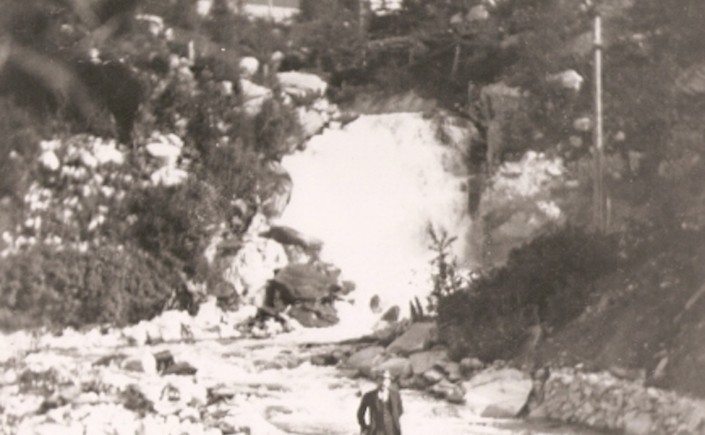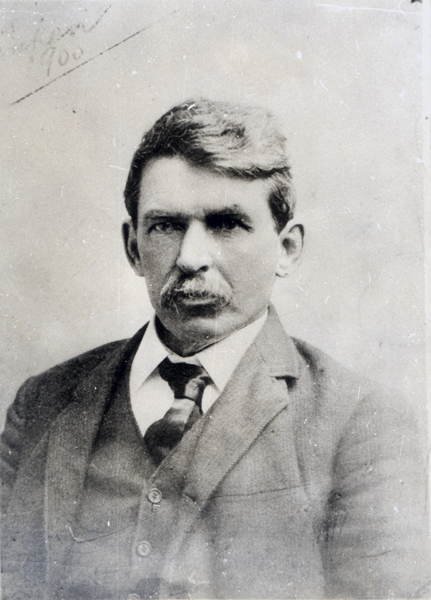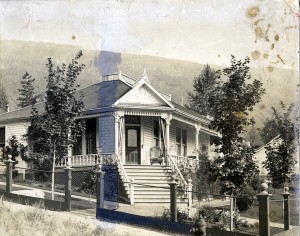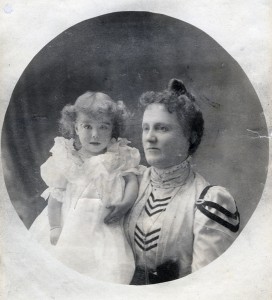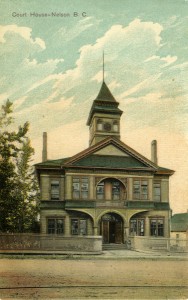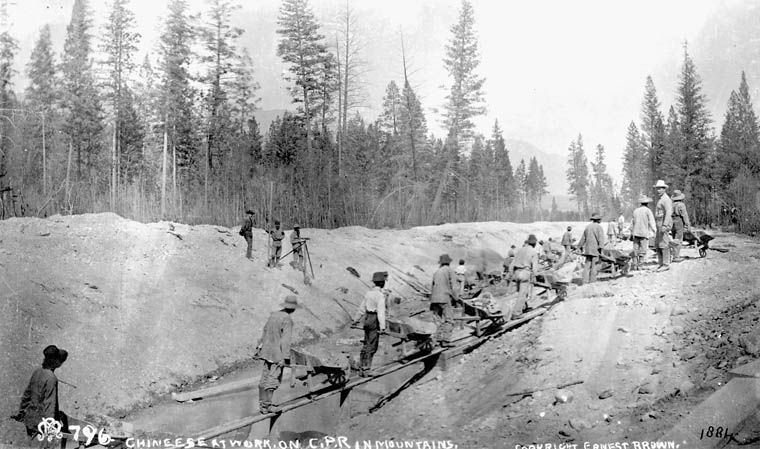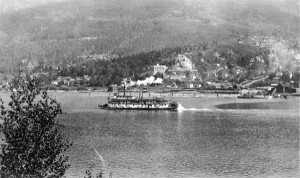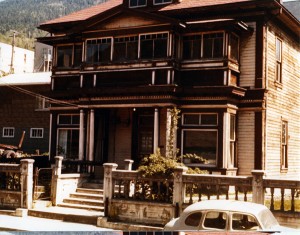An Enigma Wrapped in a Newspaper
Although a man who was famous throughout western Canada and the north-western United States, served four times as the mayor of BC’s third largest city, was elected twice to that province’s legislature, and established seven newspapers, much of John Houston’s personal life remains a mystery. The puzzle of his character, too, is almost equally difficult to solve and historians (and newspaper editors), such as in these examples below, invariably settle for a balance of contradictions:
He was an imposing and strong-willed individual given to fierce opinion and vast enthusiasm. He had a knack for making both loyal friends and ardent enemies…A champion of the common man, he disliked the “well-bred hypocrisy” he felt was “necessary to make social intercourse smooth and agreeable.”*
He caused commotion wherever he went and seemed to delight in the fact. Indeed, perhaps more than anything else, it was his faults that made him famous.
If anything he was a populist. Yet even though many of his views (antipathy to large corporations, support for trade unions, empathy for the common man) were in accord with general populist philosophy, the populist label nevertheless remains inadequate considering his real estate dealings and his tendency toward frontier profiteering.
A contemporary [W.E. Wasson] who described him as “a rough diamond,” summed him up well when he wrote: “He was dictatorial and aggressive, a rugged individualist, and if you didn’t agree with him it was “be damned to you,” but with it all he was the most democratic of mayors, with a heart as big as an ox for his friends and those in need, hiding these finer qualities under a rough exterior and bear-like growl.”
Houston, according to his co-workers,
“was indefatigable, repeatedly working for three days and two nights at a stretch, stopping only an hour for meals.”……It was only a matter of weeks, however, before he was off once more. It is quite possible that, in addition to his natural tendency to wander about the west, alcoholic excess had something to do with the frequency with which he changed jobs. When he was young he joined The Band of Hope, a temperance society, but somewhere along the line liquor took hold of him…
Patrick Wolfe , Tramp Printer Extraordinairy: British Columbia’s John “Truth” Houston BC Studies, no 40, Winter 1978-79It is admitted that his idiosyncrasies are so numerous and marked that he might do almost anything.
The Wood River Times, 1905Houston’s whiskey swilling has attracted the attention of many historians, but his role as a trenchant critic of large corporations, particularly railway companies, in British Columbia should not be overlooked. While not altruistic, he devoted himself on occasion to improving the communities in which he lived…
Frank Leonard, Canadian Dictionary of Biography…complex, idiosyncratic, obstinate, impetuous, obstreperous, combative, unyielding, compassionate, and highly aggressive…..
John Norris, Historic Nelson: The Early Years:
A Moment Of Truth
As he approached his fortieth birthday, Houston must have known a moment of truth – experiencing what we nowadays call a mid-life crisis – the result of which was a dramatic change in the pattern of his existence. Between the ages of 15 and 37 he had wandered across the United States, at times displaying the kind of concentration and dynamic energy usually associated with worldly success, at others tortured by demons whose barbs could only be dulled by alcohol. On the other side of that fortieth birthday, however, a different man emerged – not altogether free of his past weaknesses, but certainly one no longer driven into constant flight from himself.
How this came about is anyone’s guess but within the space of three years Houston, in an impressive display of will power, had established himself as a respected newspaperman, found, after a relatively brief search, his home for the next fifteen years, become a successful businessman, built a house and married Edith May Keeley of York County, Ontario. This latter fact, indeed, may provide something of an answer. Unfortunately, the previous sentence contains practically all that we know of the lady but it is certainly tempting to speculate that she played some role in the transformation of Houston from a man of the wild frontier into a (relatively) settled and respectable citizen. Could it be that his return to Canada in 1887 came by way of Ontario where a proposal was accepted and a bargain made? Certainly any subsequent travel west would have taken him to Calgary where he next appeared.
Mrs. Houston
The nature of Houston’s relationship to his wife is another mystery. He never mentioned her in print; she appears once in a contemporary diary as the hostess of a party in 1892; she is not among the guests at the reception for the Governor General when he visited Nelson in 1898 (despite John being the mayor); on the day he was floored by Mining Association Secretary Tolmie, she was suffering from blood poisoning brought on by a bee sting; it was said that even she did not know of his whereabouts when he disappeared for six weeks in 1905; she joined him later in Goldfield, Nevada; and Houston’s nephew Harry reported that she was on her way to her husband’s bedside when he died in 1910. And that is the sum total of probable facts we have to work with although historians have consistently added another ‘fact’ to the list – that the Houstons had a daughter.
There is a photograph in the Nelson Touchstones Museum of a woman of indeterminate age, holding a two-year old girl on her lap. On the back is written “Mrs. Houston” – not “Mrs. Houston and her daughter” – nor does it give the child’s name. This is all the evidence we have that the Houstons had a daughter at all, or that the woman in the photograph is indeed Edith Houston. It is not impossible that she is Mrs. Houston, the wife of nephew Harry, or even another Mrs. H. entirely. Besides Harry Houston, there was a James Houston living in Nelson, both married and both these Mrs. Houstons had young children at that time. Furthermore, according to the 1900 Canadian census, the John Houstons had no children and no surviving child was mentioned in any of Houston’s many obituaries.
Patrick Wolfe states that Mrs. John Houston “was loyal to her husband despite his fiery unpredictability and frequent absences,” but this loyalty could have been nothing more than the practicality of a woman with no better options. On that side of the scale can be put the fact that, on August 6th, 1910, The Nelson Daily News reported that “Chesley Clarke, until recently a member of the firm of Stewart & Co., was recently married in Spokane to Mrs. John Houston,” this being less than five months after his death. They resided in Spokane for many years and no subsequent census mentions a child living in the same house with them.
The Darker Side
On Monday, April 12th, 1897, three days before his election as mayor of Nelson, John Houston appeared before Police Magistrate Selous, himself a future mayor, charged with assault. The Miner, which gleefully reported the affair, suggested that it would cost him several votes and quite probably the election. That it did not is scarcely surprising. Houston’s constituents were not likely to take umbrage at any man engaging in fisticuffs and certainly not their candidate. After all, this was the third time he had been charged (and found guilty) with assault in the seven years he had been in Nelson. This particular case was a simple matter of Houston “approaching in a belligerent manner,” Michael Tebo, a Turner supporter, calling him a liar and punching him in the face when Mr. Tebo returned the abuse. For this, Houston was fined $20 and “bound in the sum of $250 to keep the peace.”
Houston’s first conviction came in 1894 when he assaulted an A.M. Johnston and received the same $20 fine. The most serious case occurred two years later when, during an interview with a number of CPR executives, he “seized a large and heavy ruler and dealt Mr. Marpole a fearful blow to the head.” The flow of blood was copious and “all the CPR men were more or less wounded.” In the following week’s edition, The Miner helpfully pointed out, “for the benefit of strangers who may call on the distinguished editor….that a doctor resides on the same floor and there is a drug store below where lint and bandages can be procured.”
Obviously, Houston never did completely turn over his new leaf, using belligerence, intimidation, and verbal as well as physical abuse to maintain his authority. For a time it served him well and as virtual dictator during his first two terms in office, he definitely got things done. In a town divided between the East Ward’s rough necks and the “white- shirted hobos” (members of The Nelson Club) in the West Ward, it also served his political purposes to champion the former against the latter – although, as Nelson prospered and began to attract a “better” class of citizen, this aspect of his personality became a liability and finally lead to his downfall.
The Miner was undoubtedly accurate in describing Houston’s political style as one of “boss rule.” One can be almost certain, given that he had the means, a very strong motive, and the opportunity to tamper with the referendum vote for the purchase of The Nelson Electric Light Company in 1898, that he violated the most basic of democratic principles. Someone as convinced as he was of the rightness of his cause, not to mention the pressing need for money, would not hesitate to turn a loss by nine votes into a win by two. Quite possibly, in fact, he did most of the things he was accused of – pocketing shareholders’ money from the sale of Nelson Electric, absconding with the furniture after the failure of the West Kootenay Board of Trade, manipulating voters lists, collecting ‘fees’ from brothels, and firing a fire wagon driver for holding contrary political views.
No doubt he justified much of his behaviour as necessary to one engaged in defending the common man against big business and the moneyed classes. But, as in all things, he was not consistent. He longed to join them, to rise to prominence and honour as a great man. Having attained the pinnacle of respectability as a member of the BC legislature, he found himself tongue-tied and out of place. Finally working up his courage with alcohol he made a fool of himself when he followed up a disastrous maiden speech with a humiliating attempted assault outside in the street. His style took him only so far and in the end defeated him and denied him the cabinet post he so ardently desired.
Houston and The Chinese
Judged by contemporary standards, John Houston, like a vast majority of his contemporaries, was a racist. He wrote disparagingly about the Chinese in his newspapers and advocated removing them from The Kootenay and, indeed, from Canada if possible. The most that can be said in his defence is that his antipathy came from the fact that Chinese workers were routinely paid much lower rates than ‘white’ workers and were used by big business to break strikes and keep wages low. Interestingly, Houston’s definition of ‘white’ was surprisingly narrow. In an article about work on the railroad he wrote about a crew that was made up of “160 whites, 65 Italians, and 175 Chinese.”
Chinese immigration to Canada was encouraged during the 1870’s and 80’s because employers wanted a cheap source of labour for work in mines, lumber camps, and the building of the trans-continental railroads. The CPR contracted Chinese agents to provide work gangs which were hired directly from China and paid extremely low wages for arduous and dangerous work. These workers, escaping dire poverty at home, were willing to accept these conditions in order to provide for their families. Once the railroads were completed, many Chinese, already accustomed to low pay, found themselves in competition with lumber and mine workers who were just beginning their struggle for fair wages and acceptable working conditions.
The ‘answer’ that most British Columbians saw to this problem was the removal of the Chinese and Houston was in agreement with this attitude- adopted as platform policy by all the BC political parties, right and left wing alike. The only real opposition to the removal of the Chinese came from mine and mill owners such as James Dunsmuir who wanted them for his coal and lumber interests and used them as ‘scab’ labour to resist strikes. Obviously, this only worsened relations between the Chinese and Caucasian workers.
In 1999, Vivienne Poy, the first Canadian of Asian descent to be appointed to the Senate of Canada, presented a history of the Chinese in Canada in an address to the Senate, the complete text of which can be accessed here.
But Some Considerable Measure of Good
Looking back from the distance of a hundred years, it is easy to see how Nelson and British Columbia are indebted to John Houston. His tireless promotion of the town and insistence on pursuing the creation of essential infrastructure and institutions made it the economic centre of the Kootenay. His fight against the CPR monopoly gave it room to grow and, indeed, benefitted the entire province by helping to expose the corrupt relationship between it and the government in Victoria as well as contributing to the province’s prosperity with trenchant criticisms of antiquated mining regulations. His energy and undeniable administrative skills as mayor achieved wonders in a few short years. And finally, his determination that Nelson should possess its own hydro electric power, for whatever motive, benefits the city to this day, providing its single greatest source of revenue.
Nor is his legacy as a newspaper man negligible. As the premature obituary, published in The Victoria Times four days before his death, stated
John was an artist in both a literary and typographical sense. His productions, no matter how inconvenient, not to say impossible, the conditions under which they were produced, were always as near perfect as was humanly possible from a technical point of view…..As a newspaper writer his style was a model. It embodied a standard of excellence in simplicity, directness, conciseness and originality which journalists…have envied and striven to copy.
We are grateful to the University of British Columbia Library for the Historical Newspaper project which gives us internet access to all of Houston’s editions of The Miner and much of The Tribune.
A Wicked Sense Of Humour
In his capacity as editor of Nelson’s most prominent newspaper, John Houston took it upon himself to solicit funds from his fellow citizens for the purchase of prizes for the various Dominion Day competitions. His zeal took him not only to the sisters, wives, mothers and daughters of Nelson’s best citizens, but also to the prostitutes residing at the opposite end of the town. In his gratitude he published a list of contributors, along with the amounts of their donations. In naming the ladies, he gave the first and last names only so that the sisters, wives, mothers and daughters found themselves side by side with the prostitutes and in no way distinguished from them. Letters to the editor of The Miner eloquently expressed the outrage of brothers, husbands, fathers, and sons and no doubt contributed greatly to the enjoyment of readers at the east end of Baker St. It was Houston at his worst and best.
